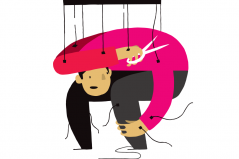Pre-registration watch part 1: Detecting deception

keywords:
pre-registration / methods / solid science
Pre-registration watch part 1: Detecting deception
In this blog post, I will report on the experiences of social psychologists, such as myself, with committing ourselves to detailed descriptions of the hypotheses and other specifics of experiments before we run them. In part 1, I briefly cover some basics about this so-called pre-registration and then I will discuss my own experience with a pre-registration in the online journal Frontiers about unconscious deception detection. / more
Free will without metaphysics

keywords:
free will / folk concepts / morality / choice / blame
Free will without metaphysics
Despite the resurgence of interest in free will, there remains confusion and disagreement regarding free will’s role in social life, in particular, how people understand free will and whether free will guides blame and praise for others. In this blog post I argue that we need to pay closer attention to the folk concept of free will in order to resolve the confusion surrounding free will in everyday life. / more
Where are the genes for psychological traits?
Where are the genes for psychological traits?
In this blog post, I will discuss the methodologies available for identifying genetic influences on psychological traits, why it has proved so difficult to reliably identify specific genes, despite 20 years of effort, and what this tells us about the nature of these genetic influences. / more
What makes Olga run?: The mystery of the 90-something track star and what she can teach us about living longer, happier lives.
What makes Olga run?: The mystery of the 90-something track star and what she can teach us about living longer, happier lives.
What Makes Olga Run is an engaging, informative and inspiring read about the international track star Olga Kotelko. At the time of the writing of the book, Olga was holding 26 world records, and had over 600 medals won at throwing, sprint, and jump events. This is quite impressive, but here is where things get really interesting: Olga is 95 years old currently, and she has taken up track-and-field at the age of 77! When award-winning Canadian writer Bruce Grierson met the astonishingly young-looking Olga a couple years ago, he had the same question that Olga awakens in many: “Seriously: When you’re breaking records, rather than hips, at an age most people will never live to see … what gives?” At his physical and mental nadir at that point in his life, Grierson decided to follow Olga and learn from her as much as possible about living healthier and happier, longer and better. The result is this book, which perfectly blends Olga’s life story with the latest on the science of optimal aging. / more
Marrying smart or marrying instead of being smart? The goal conflict between MRS degrees and STEM degrees
keywords:
romantic relationships / gender / STEM
Marrying smart or marrying instead of being smart? The goal conflict between MRS degrees and STEM degrees
In this blog post, I review a number of studies that suggest that telling women to focus on their MRS degree (aka getting married) while in college can make women less interested in earning a STEM degree (Science, Technology, Engineering & Math). Why does this matter? Because the STEM fields are in desperate need of women. Luckily, research also suggests that women in STEM are more desirable than women may realize. / more
Sticks and stones and breaking bones: Social psychology and school aggression

keywords:
school / Aggression / bullying / peer group / social identity
Sticks and stones and breaking bones: Social psychology and school aggression
Bullying is a pervasive issue in schools today. This is one of two blog posts that will look at school aggression from the perspective of contemporary social psychology. In this post, I'll examine the role of groups in encouraging bullying. In my next post, I'll look at the perspective of the bullied victims. When it comes to bullying, it seems that groups can both be a part of the problem and the solution. / more
The year the journals changed
The year the journals changed
Where do all the studies come from? Behind every headline trumpeting a new finding in psychology, you can usually find an article in a peer-reviewed psychology journal. But how reliable are these findings? This is what many scientists have recently started to wonder. Because of this, journals in psychology are starting to insist on better reporting of research studies. In this first post of a two-part series, I will explain some of the standards that have typically been used to judge whether a study deserves publication or not. / more
Colorful Culture
keywords:
culture / color / socialization
Colorful Culture
As a world without colors would be extremely boring, we are luckily able to perceive various different colors that enrich our environment. Recently, Keiko Ishii and colleagues found that the colors we prefer and use for our paintings vary systematically across cultures. But that doesn’t mean that tomorrow’s multi-cultural world is becoming black-and-white or grey, rather there is hope that it will become even more colorful than it is today. In this post, we will illustrate how individuals and cultures engage in mutual construction and thus enhance variety. / more
Word of mouth: How our tongue shapes our preferences, and why you should eat popcorn in the cinema
keywords:
embodiment / marketing / fluency / commercials
Word of mouth: How our tongue shapes our preferences, and why you should eat popcorn in the cinema
Are you sick of banner ads, commercials, and brand names depicted everywhere? You might think this way of advertising is pointless since it will not influence you anyway. However, psychological research has identified how branding hacks into your mind and how you can prevent this. Think of the last time you interacted with a person wearing brand-name clothes. For instance talking with those “cool” people with the RayBan pilot-glasses, where you do not see their eyes but only this little... / more
Inequality: Minority disadvantage or White privilege? - And why it matters

keywords:
inequality / race / ethnicity / minority / privilege
Inequality: Minority disadvantage or White privilege? - And why it matters
In this blog post, I will discuss research showing how framing ethnic inequality in terms of White advantage versus minority disadvantage impacts how Whites and minorities understand inequality and thus how we should address inequality. / more

